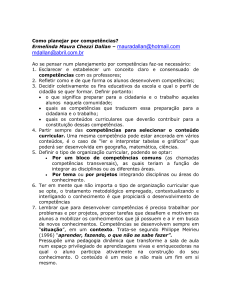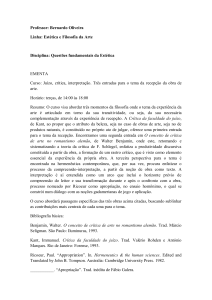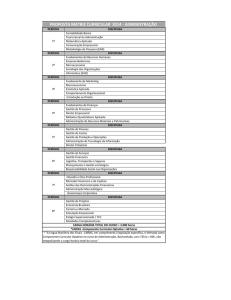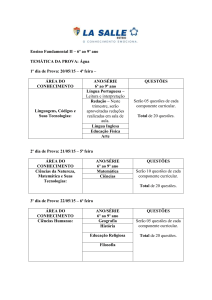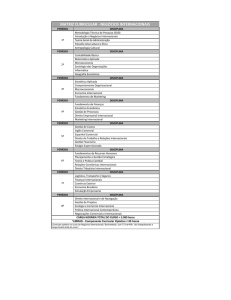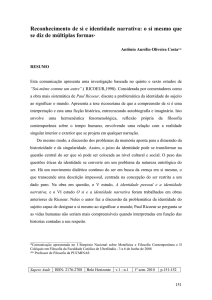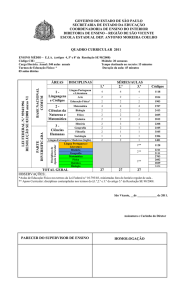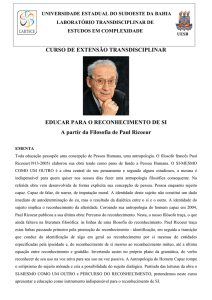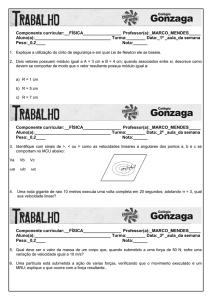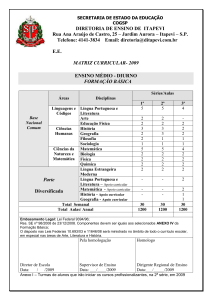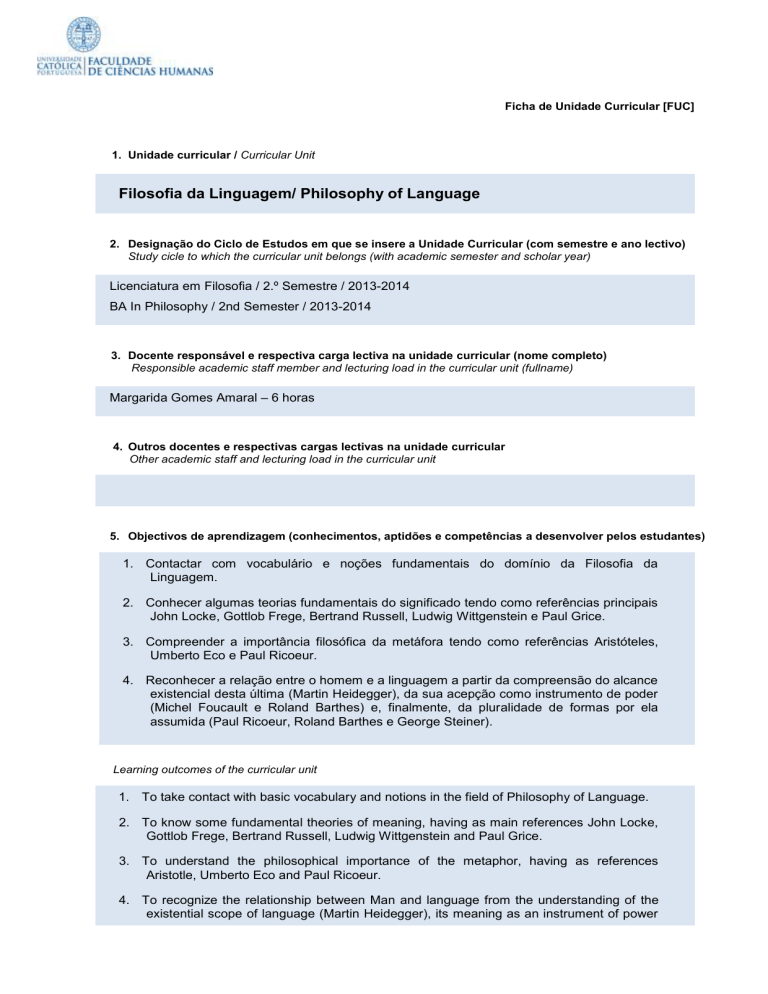
Ficha de Unidade Curricular [FUC]
1. Unidade curricular / Curricular Unit
Filosofia da Linguagem/ Philosophy of Language
2. Designação do Ciclo de Estudos em que se insere a Unidade Curricular (com semestre e ano lectivo)
Study cicle to which the curricular unit belongs (with academic semester and scholar year)
Licenciatura em Filosofia / 2.º Semestre / 2013-2014
BA In Philosophy / 2nd Semester / 2013-2014
3. Docente responsável e respectiva carga lectiva na unidade curricular (nome completo)
Responsible academic staff member and lecturing load in the curricular unit (fullname)
Margarida Gomes Amaral – 6 horas
4. Outros docentes e respectivas cargas lectivas na unidade curricular
Other academic staff and lecturing load in the curricular unit
5. Objectivos de aprendizagem (conhecimentos, aptidões e competências a desenvolver pelos estudantes)
1. Contactar com vocabulário e noções fundamentais do domínio da Filosofia da
Linguagem.
2. Conhecer algumas teorias fundamentais do significado tendo como referências principais
John Locke, Gottlob Frege, Bertrand Russell, Ludwig Wittgenstein e Paul Grice.
3. Compreender a importância filosófica da metáfora tendo como referências Aristóteles,
Umberto Eco e Paul Ricoeur.
4. Reconhecer a relação entre o homem e a linguagem a partir da compreensão do alcance
existencial desta última (Martin Heidegger), da sua acepção como instrumento de poder
(Michel Foucault e Roland Barthes) e, finalmente, da pluralidade de formas por ela
assumida (Paul Ricoeur, Roland Barthes e George Steiner).
Learning outcomes of the curricular unit
1. To take contact with basic vocabulary and notions in the field of Philosophy of Language.
2. To know some fundamental theories of meaning, having as main references John Locke,
Gottlob Frege, Bertrand Russell, Ludwig Wittgenstein and Paul Grice.
3. To understand the philosophical importance of the metaphor, having as references
Aristotle, Umberto Eco and Paul Ricoeur.
4. To recognize the relationship between Man and language from the understanding of the
existential scope of language (Martin Heidegger), its meaning as an instrument of power
(Michel Foucault and Roland Barthes), and, finally, the plurality of forms assumed by it
(Paul Ricoeur, Roland Barthes and George Steiner).
6. Conteúdos programáticos
I – Introdução à Filosofia da Linguagem
1.
Vocabulário fundamental – significado, referência, compreensão, sentido, denotação,
comunicação, pragmática, representação.
2.
Noções fundamentais – linguagem e pensamento; o ser homem, a linguagem, o
mundo e os outros.
II – Algumas teorias do significado
1.
A teoria referencial do significado.
2.
A teoria ideacional do significado.
3.
A teoria do significado como uso.
4.
A teoria psicológica do significado.
III – O significado não literal: a metáfora
1.
Aristóteles: “Transportar para uma coisa o nome de outra”.
2.
Umberto Eco: “O nó metafórico”.
3.
Paul Ricoeur: O “poema em miniatura”.
IV – A relação entre o homem e a linguagem
1.
Linguagem e existência.
2.
Linguagem e poder.
3.
Fala, escrita e outras linguagens.
Syllabus
I – Introduction to the Philosophy of Language
1.
Basic vocabulary – meaning, reference, understanding, sense, denotation,
communication, pragmatics, representation.
2.
Basic notions – language and thought; the man, the language, the world and the
others.
II – Some theories of meaning
1.
The referential theory of meaning.
2.
The ideational theory of meaning.
3.
The theory of meaning as use.
4.
The psychological theory of meaning.
III – The non-literal meaning: the metaphor
1.
Aristotle: "Transfer to one thing a name that belongs to something else”.
2.
Umberto Eco: "The metaphorical node."
3.
Paul Ricoeur: The "poem in miniature".
IV – The relationship between man and language
1.
Language and existence.
2.
Language and power.
3.
Speaking, writing and other languages.
7. Metodologia de ensino (avaliação incluída)
Ensino: A unidade curricular será lecionada em regime b-learning. Haverá quatro aulas
presenciais ao longo do semestre. As lições na plataforma ocorrerão nas semanas em que não
há aulas presenciais e terão uma periodicidade semanal.
Avaliação: Os elementos de avaliação serão uma prova escrita de avaliação (50%), atividades a
realizar na plataforma (40%) e a participação nas aulas presenciais (10%).
Teaching methodologies (including evaluation)
Teaching: The curricular unit will be taught in b-learning regime. There will be four class sessions
throughout the semester. The lessons in the platform will occur in the other weeks and will have a
weekly regularity.
Evaluation: The evaluation elements will be a written test (50%), activities to carry through in the
platform (40%) and the participation in the class sessions (10%).
8. Bibliografia principal
Main bibliography
ARISTÓTELES, Poética, trad. E. Sousa, Lisboa, Impr. Nac., 1998.
BARTHES, R., Le plaisir du texte, Paris, Seuil, 1993.
--------------, R., Le degré zéro de l'écriture, Paris, Seuil, 1972.
ECO, U., Semiótica e Filosofia da Linguagem, trad. M. Bragança, Lisboa, Piaget, 2001.
FOUCAULT, M., A ordem do discurso, trad. L. Sampaio, Lisboa, Relógio d’Água, 1997.
FREGE, G., “Sens et Dénotation”, in Écrits Logiques et Philosophiques, trad. C. Imbert,
Paris, Seuil, 1971.
GRICE, P., Studies in the way of words, Cambridge, Harvard U. P., 1993.
HEIDEGGER, M., Ser y Tiempo, trad. Jorge E. Rivera C., Madrid, Trotta, 2006.
LOCKE, J., An essay concerning human understanding, London, J. M. Dent & Sons, 1948.
LYCAN, W., Philosophy of Language, London, Routledge, 1999.
RICOEUR, P., La métaphore vive, Paris, Seuil, 1975.
STEINER, G., O silêncio dos livros, trad. Margarida S. Correia, Lisboa, Gradiva, 2007.
WITTGENSTEIN, L., Philosophical Investigations, trad. M. S. Lourenço, Lisboa, F. C.
Gulbenkian, 1995.


